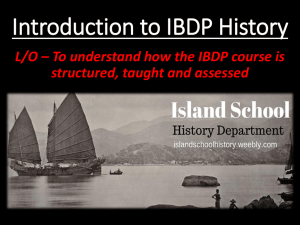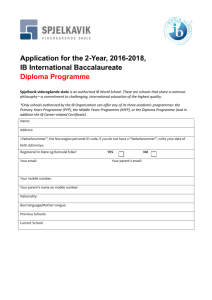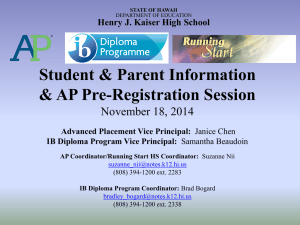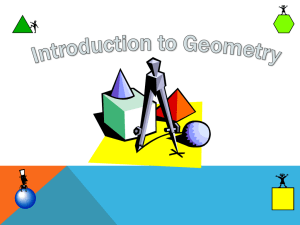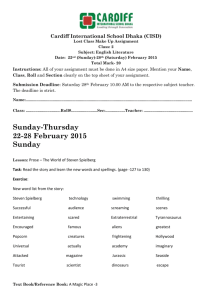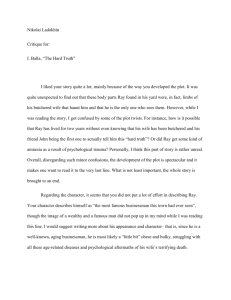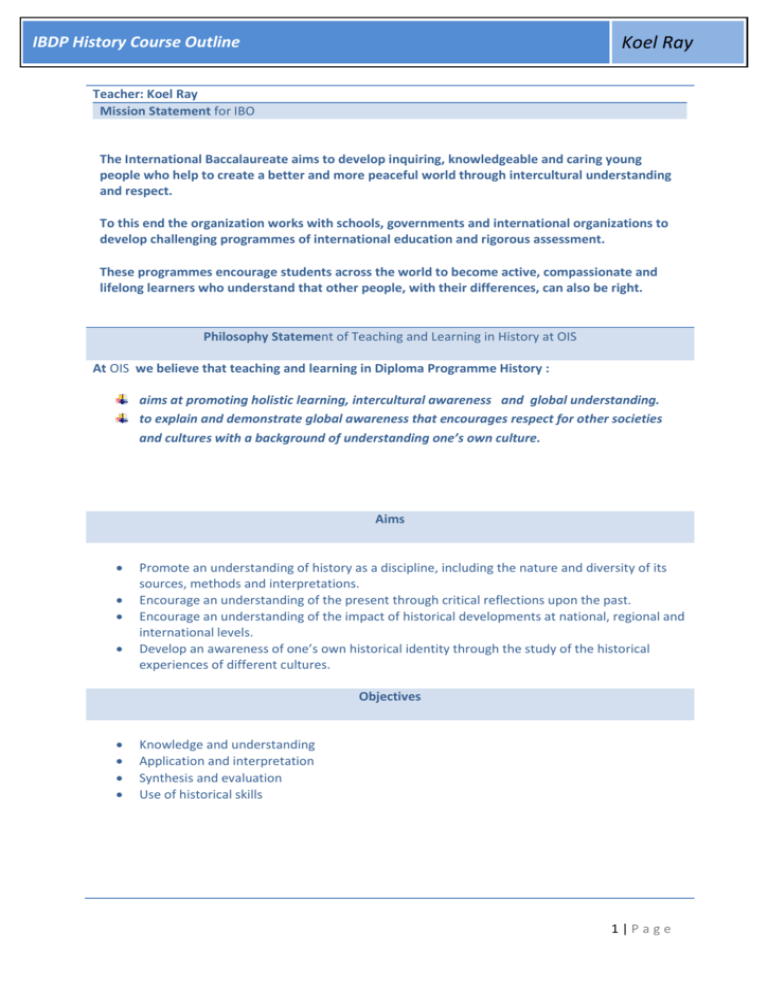
Koel Ray
IBDP History Course Outline
Teacher: Koel Ray
Mission Statement for IBO
The International Baccalaureate aims to develop inquiring, knowledgeable and caring young
people who help to create a better and more peaceful world through intercultural understanding
and respect.
To this end the organization works with schools, governments and international organizations to
develop challenging programmes of international education and rigorous assessment.
These programmes encourage students across the world to become active, compassionate and
lifelong learners who understand that other people, with their differences, can also be right.
Philosophy Statement of Teaching and Learning in History at OIS
At OIS we believe that teaching and learning in Diploma Programme History :
aims at promoting holistic learning, intercultural awareness and global understanding.
to explain and demonstrate global awareness that encourages respect for other societies
and cultures with a background of understanding one’s own culture.
Aims
Promote an understanding of history as a discipline, including the nature and diversity of its
sources, methods and interpretations.
Encourage an understanding of the present through critical reflections upon the past.
Encourage an understanding of the impact of historical developments at national, regional and
international levels.
Develop an awareness of one’s own historical identity through the study of the historical
experiences of different cultures.
Objectives
Knowledge and understanding
Application and interpretation
Synthesis and evaluation
Use of historical skills
1|Page
Koel Ray
IBDP History Course Outline
NATURE OF THE SUBJECT: HISTORY AT OIS
Group 3 subjects study individuals and societies. More commonly, these subjects are collectively
known as the human sciences or social sciences. In essence, group 3 subjects explore the interactions
between humans and their environment in time, space and place.
History is more than the study of the past. It is the process of recording, reconstructing and
interpreting the past through the investigation of a variety of sources. It is a discipline that gives
people an understanding of themselves and others in relation to the world, both past and present.
Students of history should learn how the discipline works. It is an exploratory subject that poses
questions without providing definitive answers. In order to understand the past, students must engage
with it both through exposures to primary historical sources and through the work of historians.
Historical study involves both selection and interpretation of data and critical evaluation of it. Students
of history should appreciate the relative nature of historical knowledge and understanding, as each
generation reflects its own world and preoccupations and as more evidence emerges.
Internationalism
The international perspective in Diploma Programme history provides a sound platform for the
promotion of international understanding and, inherently, the intercultural awareness necessary to
prepare students for global citizenship. Above all, it helps to foster respect and understanding of
people and events in a variety of cultures throughout the world.
TOK LINK
What is History?
Why study History?
Theories of History
Writing History- History is a selection of a selection?; Advantages and disadvantages of
hindsight? Problem of bias in History
Multiple perspectives in History
History and the ways of knowing – sense perception and the role of facts in History; emotion
and the nature of historical interpretation; reason and the tools of historical representation
Language and representation in History
The role of individual versus groups in History
Is all History the History of Human thought?
Course Pre-requisites
Students need not have studied history prior to starting this course.
The specific skills and knowledge required are developed throughout the course itself.
2|Page
Koel Ray
IBDP History Course Outline
Content and Skills
Route 2: 20th Century World History
Course Outline for Year 1 ( Grade 11)
Planning
Cycle
Content
International
Mindedness
Knowledge Issues (TOK)
1
Introduction to
International
Relations and DP
History
DP : AIMS AND
OBJECTIVES;
introduction to Route
2
Reflecting on how
the learner profile
and the IB Mission
statement might
lead to a more
peaceful world.
Fundamental aspects of human nature
in the relationship between peace and
war, self interest versus altruism
Topic 1: Causes,
practices and effects
of wars:
How might the
commitment to
being international –
minded help create a
more peaceful
world?
20thsept30th sept
First World War
(1914‑8)
Long-term, shortterm and immediate
causes
• Economic,
ideological, political,
religious causes
2
17thoct4thnov
Nature of war:
Technological
developments, tactics
and strategies, air,
land
and sea
Does the study of History widen our
knowledge of human nature? Case
study: League of Nations
The objectivity of History and the
interpretation of facts- History should
be objective but not sterile or value
free
.
Nature of 20th
century wars
• Home front:
economic and social
impact (including
changes in
the role and status of
women)
3|Page
Koel Ray
IBDP History Course Outline
Syllabus
requirements of HL
Option 5:
6. European
diplomacy and the
First World War
1870‑1923
3
Effects and results of
World War I
7thnov18thnov
Prescribed subject 1:
Peacemaking,
peacekeeping—
international
relations 1918‑36:
aims of the
participants and
peacemakers: Wilson
and the Fourteen
Points
4
21stnov2nd dec
Was Allied Powers’
treatment of the
Central Powers an
open-minded one?
How does the experience of war affect
a nation’s approach to the peace
process?
terms of the Paris
Peace Treaties
1919‑20: Versailles,
St Germain, Trianon,
Neuilly,
Sèvres/Lausanne
1923:
Syllabus
requirements of HL
Option 5:
6. European
diplomacy and the
First World War
1870‑1923
the geopolitical and
economic impact of
the treaties on
Europe; the
establishment and
TOK Link:
“Map is not the territory.”To what
extent can maps help us to understand
the reasons for and results of conflict? Explain.
4|Page
IBDP History Course Outline
impact of the
mandate system
Koel Ray
What was the geopolitical and
economic of impact of the Treaty of
Versailles on Germany?
enforcement of the
provisions of the
treaties: US
isolationism—the
retreat from the
Anglo–American
Guarantee;
disarmament—
Washington, London,
Geneva conferences
Syllabus
requirements of HL
Option 5:
6. European
diplomacy and the
First World War
1870‑1923
5
4thjan13th jan
the League of
Nations: effects of
the absence of major
powers; the principle
of collective security
and
early attempts at
peacekeeping
(1920‑5)
Under what conditions would one
support one’s country’s decision to go
to war?
• the Ruhr Crisis
(1923); Locarno and
the “Locarno Spring”
(1925)
6
16th jan20th jan
• Depression and
threats to
international peace
and collective
security:
5|Page
Koel Ray
IBDP History Course Outline
The League depended on the goodwill
of the nations to work, though it was
the absence of goodwill that made it
necessary.[Hugh Brogan- The Penguin
History of the USA,2001]
Manchuria (1931‑3)
Would Collective Security ever be
possible by the League?
Did the members of the League act
responsibly to support the principles of
the League?
7
Abyssinia (1935‑6).
30th jan3rd feb
Revision of Prescribed
Subject &Topic 1
Year 1 assessments
HL Option 5: Aspects
of the History of
Europe and the
Middle East
Internationalism
versus nationalism
8. Interwar years:
conflict and
cooperation 1919‑39
8
6th feb17th feb
Germany 1919‑33:
political,
constitutional,
economic, financial
and social problems
Can common interest be defined
internationally?
Italy 1919‑39:
Mussolini’s domestic
and foreign policies
9
27th feb9th march
The impact of the
Great Depression
(case study of its
effect on one country
in Europe)
6|Page
Koel Ray
IBDP History Course Outline
Hitler’s domestic
policy (1933‑39)
10
12th
march23rd
march
Under what circumstances would
people sacrifice their freedom ?
Hitler’s domestic and
foreign policy
(1933‑39)
Are societies that value equality less
likely to seek extreme solutions to their
problem?
The medium is the message- how did
propaganda help in the rise of
dictatorship?
Which of the following controls a
leader in a totalitarian state- emotions,
reason, natural instinct or learned
behaviour?
Hitler’s foreign policy
(1933‑39)
11
26th
march4th april
Search for collective
security;
appeasement in the
interwar years;
• Spanish Civil War:
background to the
outbreak of the Civil
War;
12
10th april20th april
Spanish Civil War:
background to the
outbreak of the Civil
War; causes and
consequences;
foreign
involvement; reasons
for Nationalist victory
Was Hitler a risk
taker in his foreign
policy? What its
impact on History?
Can nation states ever be free from
ideology and self interest in their
foreign policy?
What are the knowledge issues
involved in drawing conclusions about
historical leaders?
What is evidence? Case Study: Spanish
Civil War
How does the socio-economic and
political circumstances of a
contemporary observer influences
his/her opinion of a crisis?
7|Page
Koel Ray
IBDP History Course Outline
Search for collective
security;
appeasement in the
interwar years; the
failure of
international
diplomacy;
13
23rd april4th may
14
7th may18 th may
appeasement in the
interwar years; the
failure of
international
diplomacy;
the outbreak of war
in 1939
10. The Second
World War and postwar Western Europe
1939‑2000introduction
How does
technology pose a
threat to
international
relations?
Second World War in
Europe:
To what extent was
Japan acting as a
responsible member
of League in the
1930s?
Syllabus
requirements of
Route 2 Topic 1:
Causes, practices and
effects of wars:
Second World
War(1939-45)
Origins and causes of
World War II
15
28th may-
Japan was the actor, China acted
upon.And US was the self appointed
referee who judged by subjective rules
and called fouls without penalties, until
just before and end of the contest. This
provoked the actor in a suicidal
attempt to kill the referee.- John Paton
Davies US Diplomat.- How far is this
true?
Did scientific
advancements of the
20th century go hand
in hand with
responsibility?
Origins and causes of
World War II
8|Page
Koel Ray
IBDP History Course Outline
8th june
Nature of World War
II
16
11th june22 nd
june
Nature of World War
II
Effects of World War
II
End of Year 1 examinations
Test corrections:
Course Outline for Year 2 ( Grade 12)
Planning
Cycle
Content
International
Mindedness
Knowledge Issues (TOK)
17
HL option 5: Aspects
of the history of
Europe and
the Middle East:
Section10: Cold War
history of Europe and
the Middle East:
Section10: Cold War
What was the role of
the United Nations in
promoting
internationalism
during the Cold War
Era?
How historians select evidences they
identify as the most important or
relevant and interpret the value and
limitation of different souces.
Cold War :impact on
Germany,
18
Cold War :impact on
Germany,
9|Page
IBDP History Course Outline
Koel Ray
NATO and military
cooperation
19
NATO and military
cooperation
Post-war problems
and political and
economic recovery in
Western Europe
20
Post-war problems
and political and
economic recovery in
Western Europe
Establishment and
consolidation of the
Federal Republic of
Germany
debt 1945‑9
21
debt 1945‑9
Establishment and
consolidation of the
Federal Republic of
Germany
22
Establishment and
consolidation of the
Federal Republic of
Germany
German reunification
23
German reunification
Revision : HL option 5:
Aspects of the history
10 | P a g e
Koel Ray
IBDP History Course Outline
24
25
26
of Europe and the
Middle East
Route 2Topic 5: The
Cold Warintroduction
Cold War and the
global cultural shift
Are there winners and losers in the
Cold War?
Is ideology important to history?
Origins of the Cold
War • Ideological
differences
• Mutual suspicion
and fear
How can changes in ‘language’ affect
our understanding of the past?- refer
to Churchill’s Iron Curtain Speech.
From wartime allies to
post-war enemies
To what extent do you believe that
science and scientific development is
driven by politics and government?
Nature of the Cold
War • Ideological
opposition
How do we know MAD[mutual
assured destruction] is a valid
theory? Does validity of theory really
matter if people believe in it? Case
Study: The Cold War
Superpowers and
spheres of influence
Alliances and
diplomacy in the Cold
War
27
28
Development and
impact of the
Cold War
• Global spread of the
Cold War from its
European origins
The war Johnson
wanted to fight was
the war at home- a
war against poverty
and social injusticeThe Great Society
Programme.Was the
Vietnam War
Johnson’s War? Was
he acting responsibly?
How far is our perception of truth
controlled by language?-impact of
the images of the Vietnam war on
the American Public; comparing and
contrasting the war images with the
government/official statements and
reports of the war.
The Cuban Missile Crisis was
perceived by contemporaries as the
world being on the brink of a nuclear
holocaust. How far has this
interpretation changed over time?
Role of the United
Nations and the NonAligned Movement
11 | P a g e
Koel Ray
IBDP History Course Outline
• Role and significance
of leaders
End of the Cold War •
Break-up of Soviet
Union: internal
problems and external
pressures
• Breakdown of Soviet
control over Central
and Eastern Europe
Today we have
entered an era when
progress will be based
on the interests of all
mankind.
Consciousness of this
requires that world
policy, too, should be
determined by the
priority of the values
of all mankind.
Can common interest be defined
internationally?
The history of the past
centuries and
millennia has been a
history of almost
ubiquitous wars, and
sometimes desperate
battles, leading to
mutual destruction.
They occurred in the
clash of social and
political interests and
national hostility, be it
from ideological or
religious
incompatibility.United Nations
Address M.Gorbachev
Can nation states ever
be free from ideology
and self interest in
their pursuit of foreign
policy?
REVISION
29
REVISION
12 | P a g e
Koel Ray
IBDP History Course Outline
REVISION
30
REVISION
IB DP FINAL EXAMS
Skills
•
•
•
•
The gathering and sorting of historical evidence
The evaluation of historical evidence.
Recognizing and understanding historical processes and their relationships to human
experience, activity and motivation.
Organizing and expressing historical ideas and information.
Expectations
Students are expected to come prepared to class, with textbooks and notes for the current
topic. Students are expected to keep their notes in a file, and their practical assignments and
documentation up to date in their PSOW folder.
Students are expected to make full use of library and ICT resources to support their learning.
Students are to strictly adhere to Academic Honesty Policy of OIS and ensure that all work
submitted are authentic and original.
Text Books and Materials to be Used
HISTORY: 20TH CENTURY WORLD THE COLD WAR-ROGERS & THOMAS [HEINEMANN]
20TH CENTURY WORLD HISTORY COURSE COMPANION FOR IB DIPLOMA [OUP]
Russia America and the Cold War- Martin Mc Cauley Pearson Longman (Seminar Studies in History)
The Origins of the Cold War 9141-1949- Martin Mc Cauley Pearson Longman (Seminar Studies in
History)
13 | P a g e
Koel Ray
IBDP History Course Outline
The Cold War-Steve Phillips Heinemann
Stalinist Russia - Steve Phillips Heinemann
Germany: The Third Reich 1933 -1945 - Geoff Layton Hodder Murray - Access to History
Italy: Liberalism and Fascism 1870 - 1945 - 2nd Edition Mark Robson
Access to History series - Hodder Murray
European Dictatorships 1918 – 1945 -Stephen J Lee Routledge
Assessment Overview
Assessment Outline – SL
Assessment Component
External Assessment (2 hours 30 minutes)
Weighting
75%
Paper 1 (1 hour)
Route 2: Peace Making, peace keeping- international
relations 1918-36
30%
4 short-answer/structured questions
Assessment objectives 1-3
(25 marks)
Paper 2 (1hour 30 minutes)
Route 2:
Topic 1:Causes, practices and effects of wars;
45%
Topic 5 :The Cold War
2 extended-response questions
Assessment objectives 1-4
(40 marks)
Internal Assessment
Historical investigation on any area of the syllabus
Approximately 20 hours
25%
Assessment objectives 1-4
(25 marks)
14 | P a g e
Koel Ray
IBDP History Course Outline
Assessment Outline HLAssessment Component
External Assessment (5 Hours)
Weighting
80%
Paper 1 (1 hour)
Route 2:Prescribed subject 1:
20%
Peace Making, peace keeping- international relations
1918-36
4 short-answer/structured questions
Assessment objectives 1-3
(25 marks)
Paper 2 (1 hour 30 minutes)
25%
Route 2:
Topic 1:Causes, practices and effects of wars;
Topic 5 :The Cold War
2 extended-response questions
Assessment objectives 1-4
(40 marks)
Paper 3 (2 hours 30 minutes)
35%
Aspects of the History of Europe and the Middle East
3 extended-response questions
Assessment objectives 1-4
(60 marks)
15 | P a g e
Koel Ray
IBDP History Course Outline
Internal Assessment
20%
Historical investigation on any area of the syllabus
Approximately 20 hours
Assessment objectives 1-4; (25 marks)
Internal Assessment: Historical Investigation HL 20% SL 25%
Introduction
The historical investigation is a problem-solving activity which enables students to
demonstrate the application of their skills and knowledge, and to pursue their personal
interests without the constraints of the syllabus. The aim is to enable students to develop
and apply the skills of a historian. The internal assessment should, as far as possible, be
woven into normal classroom teaching and not be carried out in isolation. It must be a
culmination of all the skills developed in course of the subject.
Examples of the types of investigations candidates may undertake are:
a historical topic or theme using written sources or a variety of sources
a historical topic based on fieldwork; for example, a museum, archaeological site,
battlefields, churches
a historical problem using documents (this could include newspapers)
a local history project
a history project based on oral interviews
a historical investigation based on interpreting a novel, film, piece of art, for example.
A total of approximately 20 hours at both SL and HL should be allocated to the work.
Internal assessment is criterion based. Each assessment criterion has level descriptors
describing specific levels of achievement together with an appropriate range of marks.
Requirements
Candidates will be required to:
undertake a historical investigation
provide a title for the historical investigation which, in order to give focus and
direction, may be framed as a question
produce a written account, of between 1500–2000 words for HL and SL, which must
consist of:
• an outline plan of the historical investigation
• a summary of evidence
• an evaluation of sources
• an analysis
• a conclusion.
The historical investigation will be internally assessed by the teacher and externally
16 | P a g e
Koel Ray
IBDP History Course Outline
moderated by the IBO. Candidates must be aware of ethical considerations when
undertaking any investigation. They must show tact and sensitivity, respect confidentiality
and acknowledge all sources used.
Key Dates
Internal Assessment topic selection (due Januaryr,2012)
Internal Assessment Final Draft
(due September , 2012)
Internal Assessment Viva Voce
(due end September , 2012)
References:
1.Pearson Baccalaureate History series
2.Theory of Knowledge- Vivek Bammi
3.Theory of Knowledge- Lagemaat
4.20th century History Course Companion
5.Weimar and Nazi Germany- Hite and Hinton[ Hodder Murray]
6. IBDP History Guide and TOK Guide
7. Workshop ideas shared by Mark Cowe
17 | P a g e

